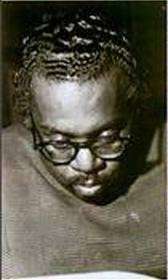Cal Massey

Calvin "Cal" Massey (January 11, 1928 – October 25, 1972) was an American jazz trumpeter and composer.[1]
Early life
Born in Philadelphia, Pennsylvania, Massey studied trumpet under Freddie Webster, and following this played in the big bands of Jay McShann, Jimmy Heath, and Billie Holiday. After that he mainly worked as a composer.[2]
Career
In the late 1950s he led an ensemble with Jimmy Garrison, McCoy Tyner, and Tootie Heath; John Coltrane and Donald Byrd occasionally played with them. In the 1950s he gradually receded from active performance and concentrated on composition; his works were recorded by Coltrane, Tyner, Freddie Hubbard, Jackie McLean, Lee Morgan, Philly Joe Jones, Horace Tapscott and Archie Shepp. Massey played and toured with Shepp from 1969 until 1972. He also performed in The Romas Orchestra with Romulus Franceschini.[2]
Massey died from a heart attack at the age of 44 in New York City, New York.[1][3] His son, Zane Massey (born 1957), is also a jazz musician.
Political life
Massey's political standpoint was radical and his work is strongly connected with the Civil Rights Movement of the 1960s and '70s. The Black Panther Party were an inspiration for The Black Liberation Movement Suite which he created with Franceschini. The Suite was performed three times at Black Panther benefit concerts. Massey's ideology resulted in him getting blacklisted (or "whitelisted" according to Fred Ho) from major recording companies and only one album was recorded under his name.[4]
Compositions
Some compositions by Massey:[2][3]
- "These Are Soulful Days", recorded by Lee Morgan
- "Bakai", recorded by John Coltrane
- "Fiesta", recorded by Philly Joe Jones
- "Assunta, Father and Son", recorded by Freddie Hubbard
- "Message from Trane", recorded by Jackie McLean
- "Cry of My People", recorded by Archie Shepp
- Lady Day: A Musical Tragedy, a musical play, several songs (his last work)
- "I Thought I'd Let You Know" by McCoy Tyner
Tribute album
- The Music of Cal Massey: A Tribute, recorded by Fred Ho, Quincy Saul and the Green Monster Band[5]
Album
- Blues to Coltrane, on Candid, recorded on January 13, 1961, and first released in 1987,[6] and again in 2006, features Massey on trumpet.[3]
The compositions on the album are his. It was recorded at Nola Penthouse Sound Studio in New York City and distributed by Black Lion Records. The five-track album is described as "...a very honest session with real depth and a rewarding listen".[6] It is the only album recorded under Massey's name.[4]
Other musicians on the album are:[4][6]
- Julius Watkins, French horn
- Patti Brown, piano
- Jimmy Garrison, bass
- Hugh Brodie, tenor saxophone
- G. T. Hogan, drums
References
- 1 2 "Cal Massey". www.discogs.com. Discogs. Retrieved December 5, 2015.
- 1 2 3 Wynn, Ron. "Cal Massey". www.allmusic.com. AllMusic. Retrieved December 5, 2015.
- 1 2 3 Chell, Samuel (January 16, 2008). "Cal Massey: Blues to Coltrane (2006)". www.allaboutjazz.com. All About Jazz. Retrieved December 5, 2015.
- 1 2 3 Taylor, Jeffrey (2010). "Brooklyn Rediscovers Cal Massey" (PDF). www.brooklyn.cuny.edu. American Music Review. Retrieved December 12, 2015.
- ↑ "Fred Ho, Quincy Saul – The Music Of Cal Massey: A Tribute". www.discogs.com. Discogs. Retrieved December 28, 2015.
- 1 2 3 "Cal Massey – Blues To Coltrane". www.discogs.com. Discogs. Retrieved December 12, 2015.
Further reading
- Ho, Fred (2009). "The Damned Don't Cry: The Life and Music of Calvin Massey". Wicked Theory, Naked Practice: A Fred Ho Reader (University of Minnesota Press).